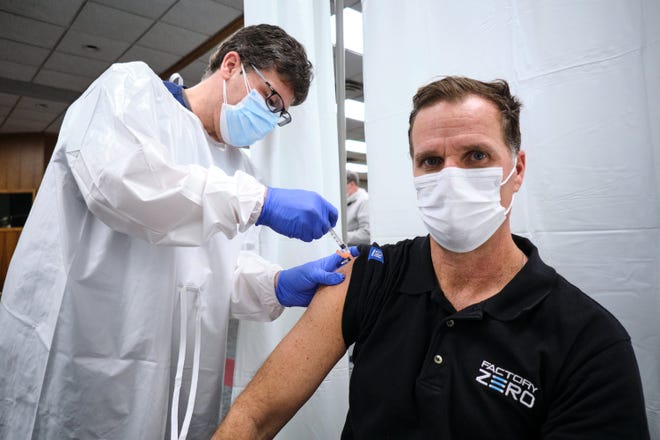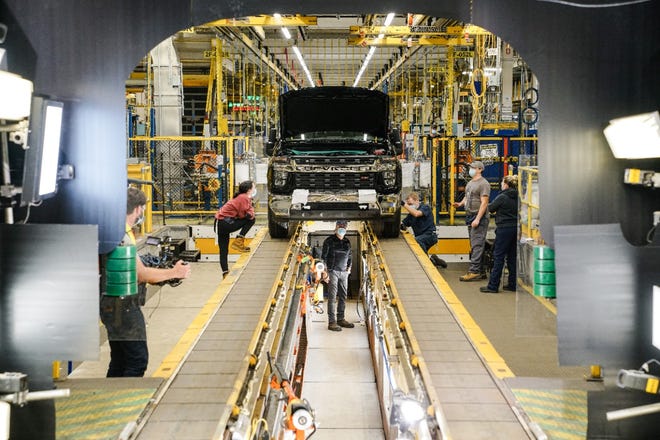General Motors and its union in Canada are faced with the possible firing of dozens of workers who refuse to get vaccinated against COVID-19.
On Thursday, Unifor said about 1% of GM Canada’s 7,000 autoworkers have chosen not to meet the company’s Dec. 12 deadline to get vaccinated, facing possible termination.
Unifor, the union that represents about 35,000 of Canada’s total automotive workforce, said about 70 of GM Canada’s employees were put on unpaid leave Wednesday.
Those employees have either not complied with GM Canada’s Dec. 8 deadline to report their vaccination status and show proof of full vaccination or they refused to meet the Dec. 12 deadline to be fully vaccinated, said Dino Chiodo, director of auto for Unifor.

Unifor supports GM, Stellantis and Ford Motor Co. in their policies requiring vaccine reporting and mandatory vaccination in Canada, Chiodo said.
Chiodo said the union believes full vaccination is the only way to stop the pandemic from spreading as variants of the disease continue to proliferate, including the latest omicron strain.
“We believe in mandatory vaccination,” Chiodo said. “But there’s a way to get there too, and the company understands that. Nobody wants to see anyone terminated because of this, because some people have legitimate concerns.”
GM Canada told the Free Press Thursday “the overwhelming majority of Canada employees” have met the requirements for the vaccination policy.
“For those who are not compliant, GM Canada is working with them individually to develop a reasonable plan to become fully vaccinated, to secure an approved exemption, or to make other employment arrangements,” GM said in a statement.
Carmakers’ U.S. policy
On Thursday, GM, Ford and Stellantis, formerly called Fiat Chrysler Automobiles, reiterated they strongly encourage employees in the U.S., who are eligible to get a vaccine, to do so.
In the U.S., the Detroit Three are working with the UAW on vaccine mandates for hourly workers, awaiting clarity from the government on a workplace mandate.
Earlier this year, President Joe Biden said businesses with at least 100 employees would have to require employees show proof of full vaccination or get a COVID-19 test weekly. The requirement was blocked in early November by a federal appeals court, and implementation and enforcement of the rule is on hold for now.
UAW spokesman Brian Rothenberg said Thursday he is not aware of any upcoming meetings for the COVID-19 Joint Task Force, which is comprised of the UAW, Ford, GM and Stellantis.
GM spokeswoman Maria Raynal said the automaker continues to review the rules “with multiple internal and external stakeholders” to determine the actions it must take to ensure company-wide understanding and compliance. It will keep U.S. employees posted as the details of GM’s vaccination compliance plans emerge.
In August, GM confirmed it had confidentially asked its roughly 48,000 U.S. salaried workers to share their vaccine information so it could assess overall immunity levels and guide its safety protocols. GM required those employees who said they were fully vaccinated to submit proof of their status.
Ford spokeswoman Marisa Bradley said Ford is requiring most U.S. salaried employees to be fully vaccinated by Jan. 18. “The health and safety of our workforce remains our top priority and we have been very encouraged by the support of our employees to comply with our protocols, including the more than 85 percent of U.S. salaried employees who are already vaccinated,” Bradley said.
At Stellantis, spokeswoman Jodi Tinson said as the company prepares for a phased reopening of its U.S. offices starting next year, it required all U.S. salaried non-represented employees to report and submit proof of their COVID-19 vaccination status by Dec. 4, and receive their final dose by Jan. 5. Tinson declined to say how many employees have complied with the Dec. 4 deadline.
All U.S. employees are required to self-certify their vaccination and health status before entering a Stellantis facility each day and a mandatory mask policy remains in place at all locations, Tinson said.
Canada and exemptions
In Canada, GM had the earliest deadline among the Detroit Three for its vaccine mandate compliance.
GM has some parts distribution centers and three main factories there: CAMI Assembly in Ontario where it builds the Chevy Equinox SUV, Oshawa Assembly in Ontario where it just started building Chevy Silverado pickups, and St. Catharines Propulsion Plant where it builds engines that are shipped to GM plants worldwide and used in a variety of GM vehicles.

Stellantis is giving employees until Dec. 31 to be fully vaccinated or apply for special exemption, which it will review on a case-by-case basis, Chiodo said.
Stellantis of Canada spokeswoman LouAnn Gosselin confirmed that date saying, “the company will require all employees, contractors, service provider workers and visitors at Stellantis sites in Canada to be fully vaccinated against COVID-19 and provide proof of vaccination status prior to entering a Stellantis facility, as recommended by the Ministry of Health and Provincial Health Officer.”
Ford has moved back the deadline for workers in Canada to report their vaccination status from earlier this month to Jan. 10. Because Canada requires eight weeks between shots, Ford has moved out the full-vaccination deadline there to March 28, Chiodo said.
“In Canada, we have also been very encouraged by the support of our employees to comply with our protocols, including the approximately 90 percent of our hourly and salaried workforce who are fully vaccinated,” said Ford of Canada spokeswoman Kerri Stoakley.
“To encourage vaccination, unvaccinated employees who do not have a Company approved accommodation will be provided with educational resources including information about how COVID-19 vaccines work, vaccine safety related to the development of the COVID-19 vaccines, benefits of vaccination against COVID-19, risks of not being vaccinated against COVID-19, and possible side effects of COVID-19 vaccination.”
Unifor’s grievance process
If Detroit Three workers in Canada are not vaccinated by the automaker deadline dates and do not qualify for an exemption, they, too, will go on unpaid leave and face possible termination, Chiodo said.
While Unifor supports mandated vaccination and the consequences for non-compliance, Chiodo said the union will file a grievance on behalf of a member if it feels the person was treated unfairly.
At GM, for example, Chiodo said if someone got their first shot, but because of the two-month wait period between shots was not able to get the second one by Dec. 12, they would likely be exempt from disciplinary action.
Also, “a person who is pregnant and might have anxiety about getting the vaccine, or if someone is going to retire in a few months, why force them to get one if they’re exiting the company?” Chiodo said.
Chiodo said he had limited conversations with his counterparts at the UAW in October over a vaccine mandate, but the UAW told him it was not exploring anything at that time.
“(The automakers) rolled out the mandates with us prior to doing anything with the United States because our COVID vaccination numbers were so high already across Canada. It was 80% of the population already had vaccination status,” Chiodo said. “I think companies had the ability and comfort to say, ‘We should do this, it makes sense and it protects our members so we’ll move forward on this mandate.’ ”
More:Detroit 3 mandate vaccine for Canada workforce, considering for US
Content in this story was edited after publishing.
Contact Jamie L. LaReau at 313-222-2149 or jlareau@freepress.com. Follow her on Twitter @jlareauan. Read more on General Motors and sign up for our autos newsletter. Become a subscriber.